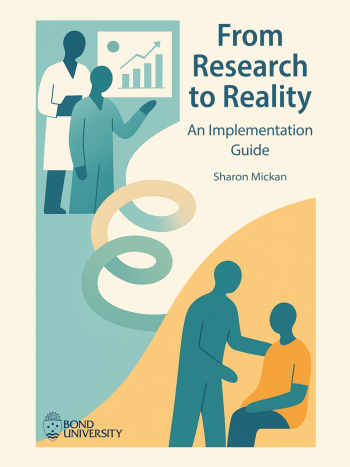
ANZCA signs first no-cost open-access publishing agreement
ANZCA has signed an agreement with Springer Medicine publishing which provides ANZCA researchers with the opportunity to publish their articles at no-cost in Springer/Palgrave hybrid journals. This includes such journals as: Journal of Anesthesia, Canadian Journal of Anesthesia, Intensive Care Medicine and Die Anaesthesiologie, plus many many more.

 From Research to Reality: An Implementation Guide
by
'From Research to Reality' is a conversation starter, an informative resource, and a practical companion for every healthcare professional trying to make change happen.
From Research to Reality: An Implementation Guide
by
'From Research to Reality' is a conversation starter, an informative resource, and a practical companion for every healthcare professional trying to make change happen.
 Cultural Safety in Health: Professional Practice, Pedagogy and Research
by
Cultural safety seeks to address power and privilege imbalances in institutions and throughout society. It addresses systemic, scientific, and personal racism, which create and sustain health inequalities in neo-colonial societies such as Australia and Aotearoa/New Zealand. This book aims to provide health students, their educators and practicing health professionals with an in-depth understanding of cultural safety and guidance on developing the key skills required to ensure culturally safe and respectful care in diverse health professions.
Cultural Safety in Health: Professional Practice, Pedagogy and Research
by
Cultural safety seeks to address power and privilege imbalances in institutions and throughout society. It addresses systemic, scientific, and personal racism, which create and sustain health inequalities in neo-colonial societies such as Australia and Aotearoa/New Zealand. This book aims to provide health students, their educators and practicing health professionals with an in-depth understanding of cultural safety and guidance on developing the key skills required to ensure culturally safe and respectful care in diverse health professions.
 A Guide to Performing Systematic Reviews of Health and Disease
by
From research questions to the final report, Kurinchi Gurusamy demystifies the process of conducting high-quality systematic reviews of health and disease. Systematic reviews are the foundation of evidence-based healthcare, shaping treatment decisions and public health policies. A Guide to Performing Systematic Reviews of Health and Disease is a practical, step-by-step resource designed to help students and health professionals conduct high-quality reviews with confidence, even without extensive statistical training. This guide walks readers through the entire review process using free, open-source software. Each chapter features clear learning objectives and integrated videos to support hands-on learning.
A Guide to Performing Systematic Reviews of Health and Disease
by
From research questions to the final report, Kurinchi Gurusamy demystifies the process of conducting high-quality systematic reviews of health and disease. Systematic reviews are the foundation of evidence-based healthcare, shaping treatment decisions and public health policies. A Guide to Performing Systematic Reviews of Health and Disease is a practical, step-by-step resource designed to help students and health professionals conduct high-quality reviews with confidence, even without extensive statistical training. This guide walks readers through the entire review process using free, open-source software. Each chapter features clear learning objectives and integrated videos to support hands-on learning.

NEJM Evidence offers a behind-the-scenes view of clinical trials that enables readers to develop a deeper understanding of the statistical methods used in trials, to become more sophisticated evaluators of medical evidence, and to learn from trial participants whose stories can help shape and inform the future direction of clinical trial design.
 Want to learn more about the research lifecycle at ANZCA? Check out the Research Support Toolkit (RSTK).
Want to learn more about the research lifecycle at ANZCA? Check out the Research Support Toolkit (RSTK).
 Need help with your research project? Request support via our Research Consultation Service.
Need help with your research project? Request support via our Research Consultation Service.
MeSH 2025 Reload
The Ovid MEDLINE database is currently being updated for 2025.
Quick links
About ANZCA
Copyright © Australian and New Zealand College of Anaesthetists.